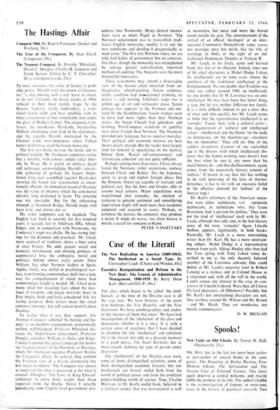The Hastings Affair
The Norman Conquest. By Dorothy Whitelock, David C. Douglas. Charles H. Lemmon and Frank Barlow. Edited by C. T. Chevallier. (Eyre and Spottiswoode, 21s.) To most amateurs. the value of history is prob- ably poetic. 'Harold wore his crown at Glouces- ter,' a ship moving with a cry' leave us intact, or do not. Certainly the hoary events of 1066, reduced to their most starkly tragic by the Bayeux Tapestry (really embroidery, a tradi- tional Saxon skill). can bear retelling, with its bitter conjunction of four remarkable men under the glare of Halley's Comet. The enigmatic Con- fessor, the murderous Hardrada, businesslike William enveloping even God in his diplomacy, and the capable Harold, mistreated by the Channel wind, over-impetuous where Fabian tactics might have saved the Saxon monarchy.
The first two books narrate the battle and its political prelude. Mr. Furneaux sometimes writes like a novelist; with colours added rather liber- ally by Wace. He is useful on military detail and technique, acknowledging Harold's remark- able gathering of perhaps the largest Anglo- Saxon force ever assembled (against Hardrada), showing the Saxon war organisation as excep- tionally effi,:ient. An immediate lesson of Hastings was the value of infantry which the continental chivalry long disdained to learn. The outcome was not inevitable. But for the exhausting triumph at Stamford Bridge, Harold might well have won. and almost did so.
His wider judgments can be slapdash. 'The English had lived in anarchy for five hundred years' is scarcely fair to Athelstan, Offa, Alfred, Edgar, and, in comparison with Normandy, the Confessor's reign was idyllic. He has strong feel- ings for the dramatic and practical: Mr. Lloyd, more sceptical of tradition, shows a finer sense of total history. He adds greater social and domestic information, and enticing glimpses of supernatural lore, the ambiguity, moral and political, behind almost every action. Duke William, like other Norman leaders in Spain, Apulia, Sicily, was skilful in psychological war- fare, transforming commonplace theft into a holy war, for comprehension of which more than commonplace insight is needed. Mr. Lloyd gives many small but revealing facts about the mys- tique of weapons, and pagan survivals; bears in East Anglia, birds and fowls considered 'fish' for fasting purposes. Both writers make this ritual centenary moving: few will remain neutral about Hastings.
To realise what it was they support, The Norman Conquest, subtitled 'Its Setting and Im- pact,' is an excellent compendium, economically written, well-balanced. Professor Whitelock dis- cusses the Anglo-Saxon achievement, Professor Douglas considers William as Duke and King: Colonel Lemmon the actual campaign (he doubts the 'feigned retreat' of the Normans at Hastings, which Mr. Furneaux accepts), Professor Barlow the Conquest's effects. In general, they confirm the Freeman view of a drastic aristocratic but not social revolution. 'The Conquest was almost as important for what it preserved as for what it created' 4Douglas). 'The Laws of King Edward' continued to carry more weight than those imported from the Duchy. Henry I actually introducing some English local government pro-
cedures into Normandy. Many clerical innova- tions were as much Papal as Norman. 'The Norman achievement was to re-establish tradi- tional English monarchy, modify it to suit the new conditions and develop it pragmatically as need arose.' The first two Norman rulers, we are told, had habits of government but no construe- five ideas, though the monarchy was strengthened by scutage, greater centralisation, improved methods of auditing. The Angevins were the more formidable innovators.
These assessments may amend a disparaging view of the Saxons often inherited from un- imaginative school-teaching. Saxon sculpture, crafts, erudition had international standing, its poetry is still moving. Ethelred's reign was a golden age of art and vernacular prose. Saxon coinage was superior to the Norman and imi- tated by the Scandinavians. Saxon women seem to have had more rights than their Norman sisters, the Saxon Church had splendour and learning. Post-Conquest standards of gentility were more French than Norman. The Normans provided new language. but no superior morality. Their political and economic motives are here shown clearly enough. But the reader must largely fend for himself in speculating on the motives behind them. 'Racial self-consciousness' and 'aristocratic cohesion' are not quite sufficient.
Perhaps seeking more than exists, I have always found the Normans rather mysterious, midway between Christ and Baldur; like the Japanese, quick to grasp and exploit foreign ideas; like the Romans, brutal yet capable of restraint and political tact; like the Jews and Greeks, able to assume local colours. Major expeditions were transformed into crusades, the relation of cynicism to genuine sentiment and smouldering superstition might still need more than academic judgment and research to assess. Perhaps, to complete the picture, the centenary may produce a poem. It might do worse; too often history is merely a search for someone to blame.
PETER VANSITTART


































 Previous page
Previous page